We are committed to the highest standards of corporate governance and support the principles of openness, integrity and accountability
Del Monte Pacific Board of Directors Rolando C Gapud, Benedict Kwek Gim Song, Godfrey E Scotchbrook, Yvonne Goh, Joselito D Campos, Jr, Edgardo M Cruz, Jr, Emil Q Javier with Del Monte Foods Directors, Luis F Alejandro, and Jeanette Naughton
DMPL has a corporate governance structure which ensures that the Board and management are accountable to shareholders while operating in an ethical manner. Our Board of Directors directs the long-term strategy of the Group, evaluates the performance of the Board and Management, reviews material issues, and provides guidance on matters relating to governance. The Group has implemented a set of environmental, social and governance (ESG) related key performance indicators based on the recommendation of the Singapore Exchange.
For more information regarding our governance principles, please refer to our FY2022 Annual Report at www.delmontepacific.com/ corporate-governance.
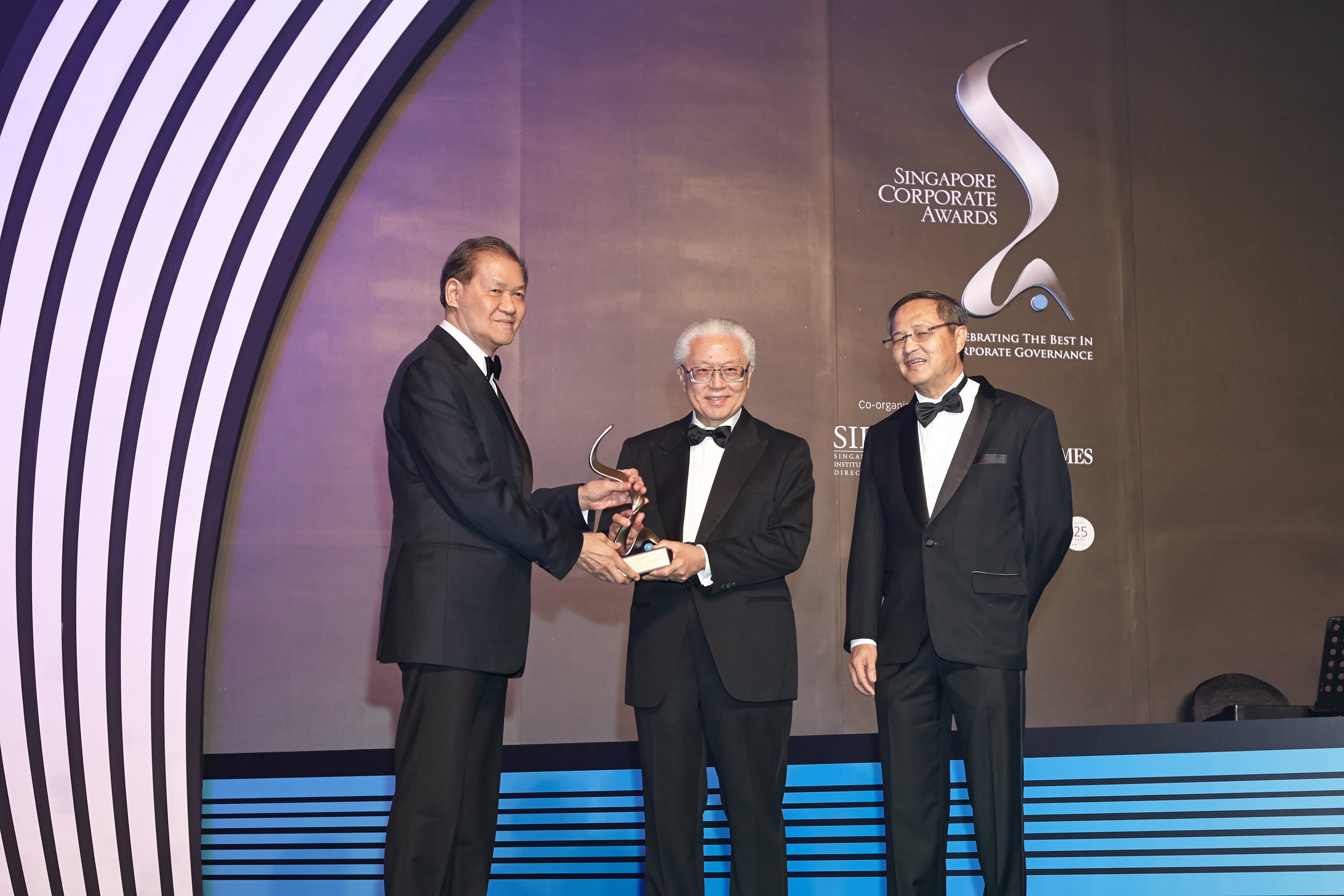
Executive Chairman Rolando C. Gapud receiving the Best Managed Board Award from former Singapore President Dr. Tony Tan
.png?width=900&name=Governance%20Infographic%20(1).png)
Board Governance
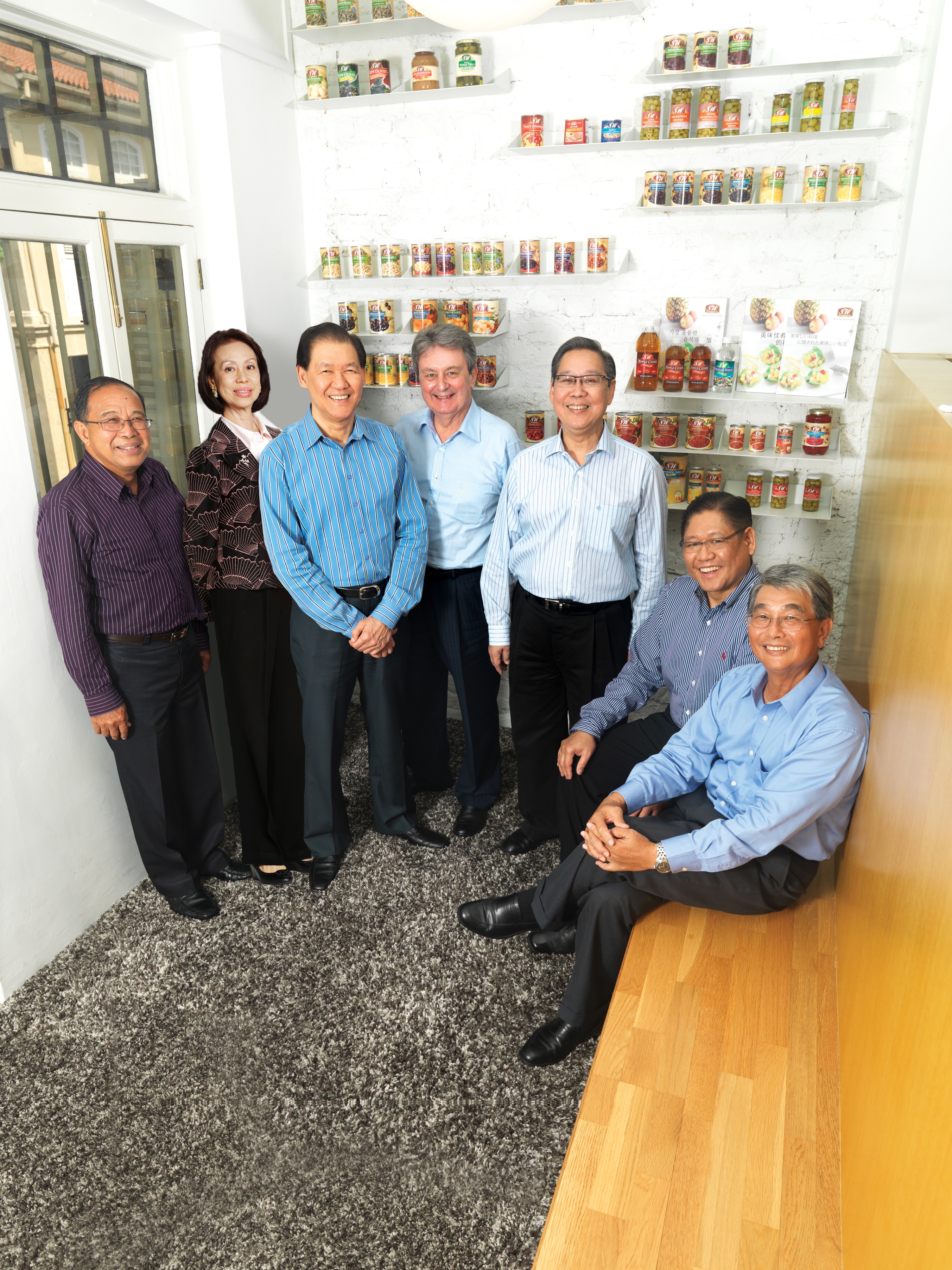
Del Monte Pacific Board of Directors Emil Q. Javier, Yvonne Goh, Rolando C. Gapud, Godfrey E. Scotchbrook, Joselito D. Campos, Jr., Edgardo M. Cruz, Jr. and Benedict Kwek Gim Song
Sustainability Governance Structure of DMPL
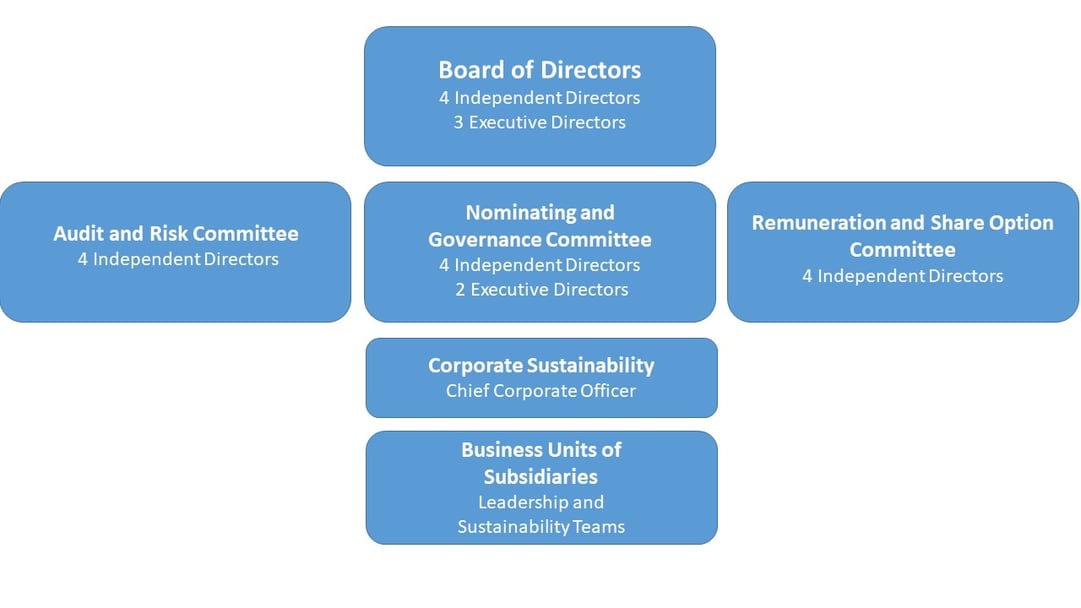
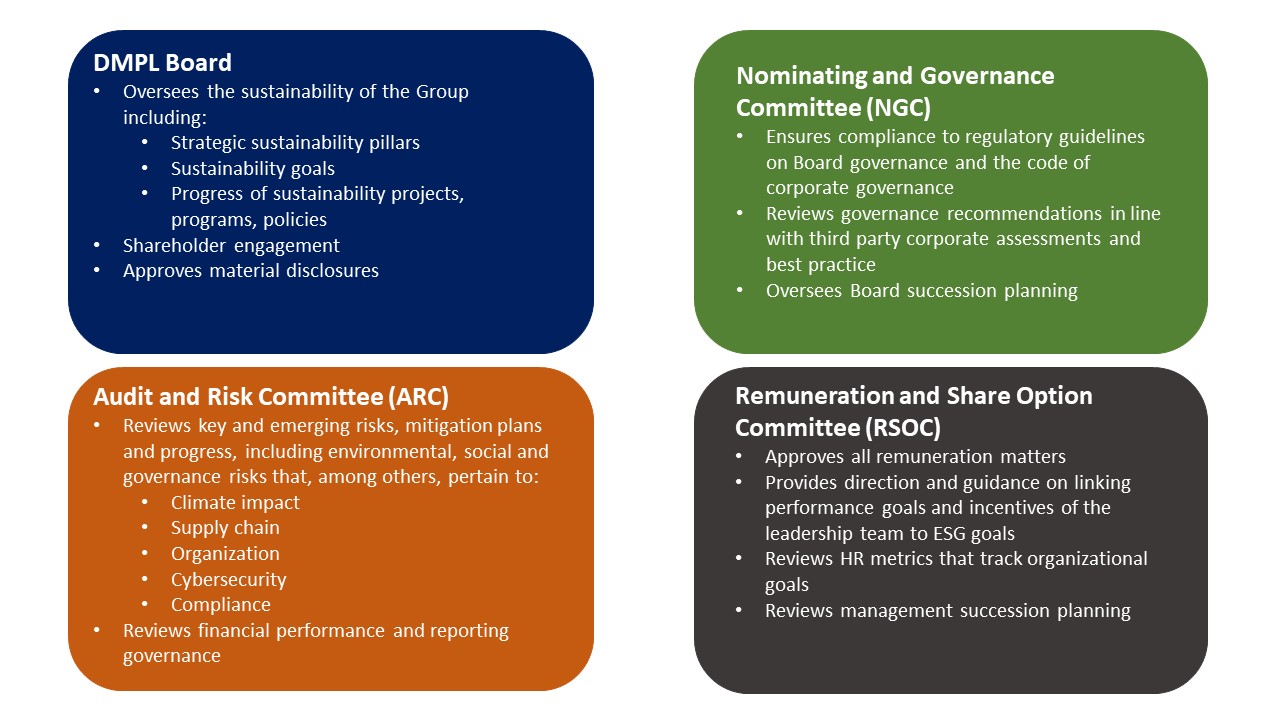
- The Company maintains corporate governance principles. Four out of seven members of the Board are independent directors. Chairpersons and all members of two Board committees (Audit and Risk, and Remuneration and Share Option) are independent directors. The Company’s Board is accountable to the shareholders.
- Four out of six members of the Nominating and Governance Committee (NGC) are independent directors. The NGC has formalized procedures for the selection, appointment and re-appointment of Directors. Letters of appointment are issued to new Directors setting out their duties, obligations, and terms of appointment, as appropriate.The Board is of the view that all Directors objectively discharged their duties and responsibilities at all times as fiduciaries, in the best interest of the Company.
- The NGC, on an annual basis, determines whether or not a Director is independent, taking into account the 2018 Code’s definition. Independence is taken to mean that Directors are independent in conduct, character and judgement, and have no relationship with the Company, or its related corporations, its substantial shareholders or its officers that could interfere, or be reasonably perceived to interfere, with the exercise of the Director’s independent business judgment in the best interest of the Company. Disclosures of Directors’ interests and their interest in transactions are standing agenda items in all Board meetings, and such disclosures would be circulated and tabled for Board members’ information, as appropriate.
- The Board has adopted a Board Diversity Policy which recognizes the importance of diversity. The Board firmly believes that its effectiveness and decision-making will be enhanced as it harnesses the variety of skills, industry and business experiences, gender, age, ethnicity and culture, geographical background and nationalities, tenure of service, and other distinguishing qualities of its own diverse Board. The NGC is responsible for administering this policy and for evaluating it annually.
- The Group’s Board is headed by the Executive Chairman. The duties of the Executive Chairman include, among other things, providing leadership to the Board and ensuring the effectiveness of the Board in all aspects, leading the Company in its relationships with stakeholders and setting the course for the Company to reach greater heights. The Executive Chairman leads the Board in charting the strategic roadmap of the Company including setting the vision and the key initiatives to achieve it. He is in the forefront of any acquisitions, joint ventures, and strategic alliances of the Company. The Executive Chairman also sets the tone of Board meetings to encourage proactive participation and constructive discussions on agenda topics. At Board meetings, he ensures that adequate time is allocated for discussion of all agenda items, in particular, discussions on strategic matters and issues.
- The Board also receives regular training updates on matters affecting the Group’s business and operations. In addition, all Directors are required to undergo annual continuing training as may be relevant to the effective discharge of their responsibilities, at the expense of the Company. A special Board meeting on Sustainability was held in March 2022 to discuss the Group’s sustainability plan. A representative of the Singapore Institute of Directors made a presentation on the “Board’s ESG Responsibility.” The CEO of one of the Corporate Knights’ 100 Most Sustainable Companies made a presentation on his company’s sustainability journey.
- All seven directors have registered for ESG courses in 2022, based on the list provided by the SGX, as part of their sustainability training as Board members. Among others, the courses include the Board’s roles and responsibilities with respect to sustainability, ESG developments, value creation through ESG, sustainability reporting and climate-related risks reporting.
- It is the intention of the Board to establish a separate Sustainability Committee. Sustainability, compliance and risk matters are reported regularly to the Board.
- DMPL implements a Securities Dealings Policy which prohibits designated people within the Group, including Directors and key management personnel, to deal with the Company’s securities during closed window periods or while in possession of unpublished material or price-sensitive information, or to provide such information to others.
- The Group implements a Whistleblower Policy that aims to deter and uncover any corrupt and unethical act detrimental to its interests that may be committed by officers and employees, as well as third parties or any other persons such as suppliers and contractors.
- DMPL was honored with the Best Managed Board Award (Gold) twice at the Singapore Corporate Awards.
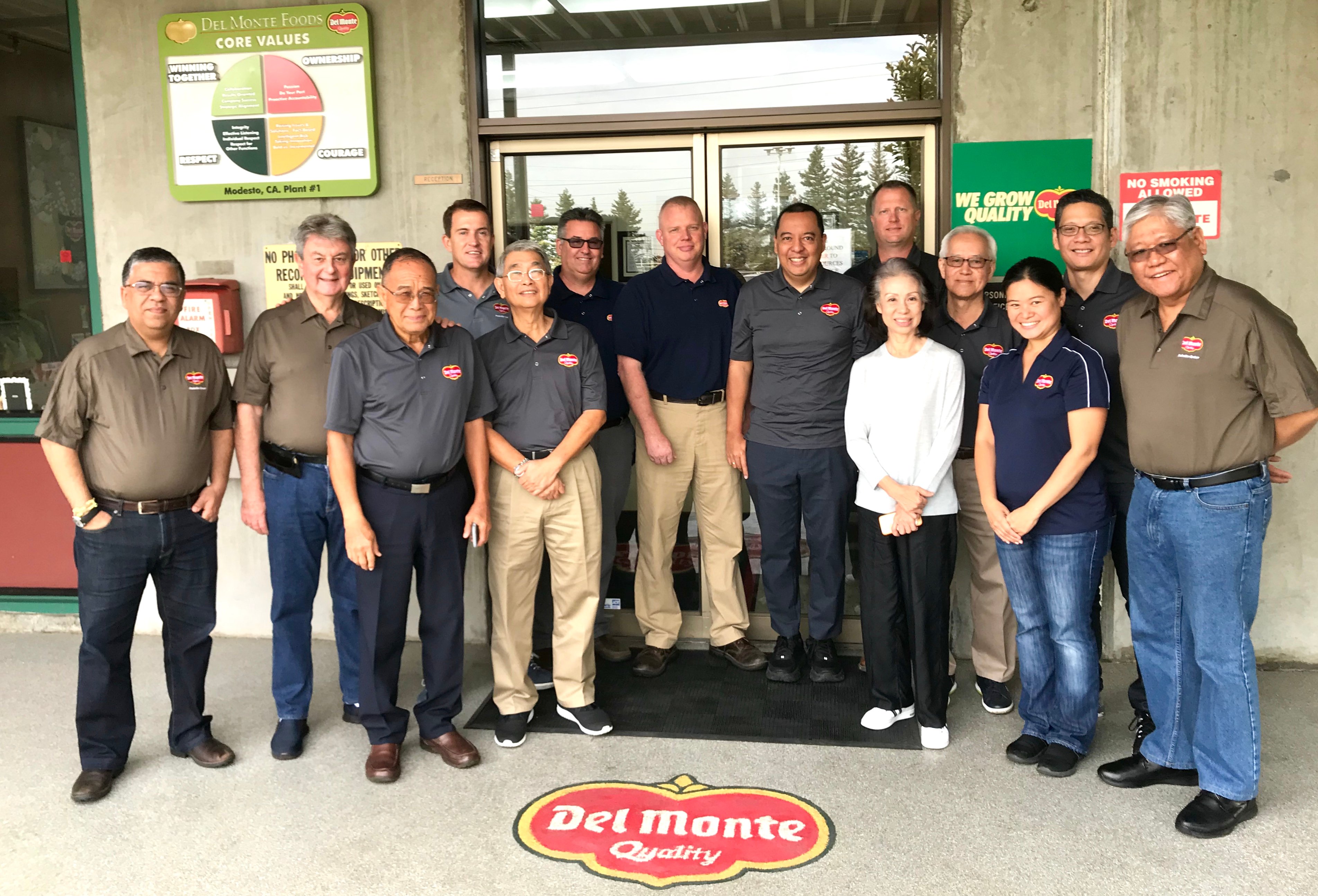
Directors visiting Modesto Plant in California with Management
Ethics and Integrity
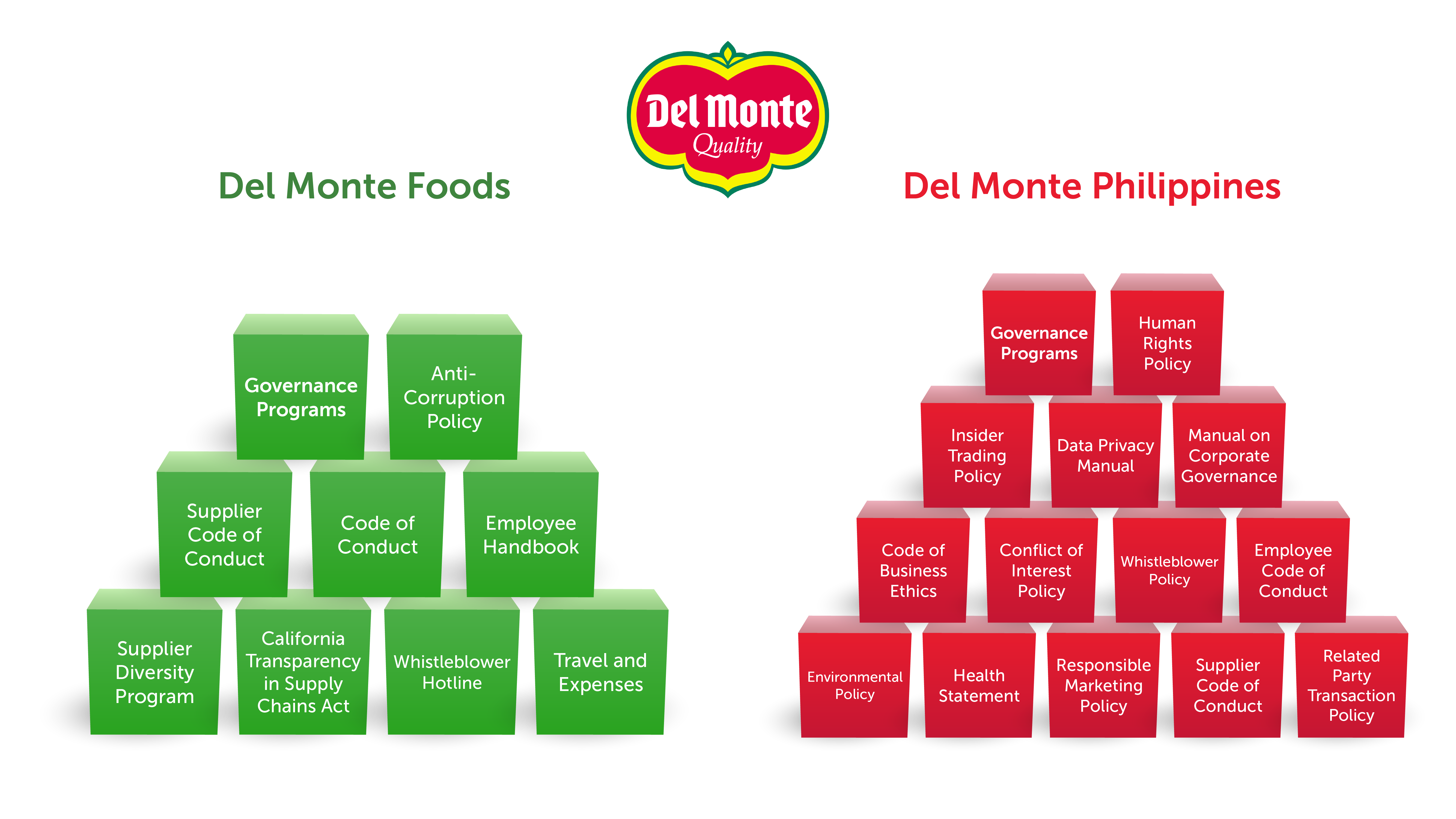
With respect to ethics and integrity, the DMPL Group supports the principles advocated by the Singapore Exchange Securities Trading Limited, the Philippine Stock Exchange, Inc., and the Securities and Exchange Commission of the Philippines.
- The Group disclosed its new policies as part of its ESG disclosures in the DMPL website: https://www.delmontepacific.com/corporate-governance/ch-manual-1
a. Environmental Policy
b. Health Statement
c. Responsible Marketing Policy
d. Supplier Code of Conduct
- Del Monte Foods, Inc.’s (DMFI) Code of Conduct, prohibits employees, contractors and consultants from engaging in any bribery or the making of improper payments to improperly influence, directly or indirectly, any foreign government employees, employees of government-controlled businesses, political parties or candidates.
- DMFI adopted the International Anti-Corruption Policy to establish the specific standards and procedures to be followed by employees, consultants and business partners to prevent official corruption and improper payments in the conduct of Del Monte’s business worldwide.
- Anti-corruption training is provided to management and certain personnel that may potentially interact with government officials, including personnel from Legal, Accounting, HR, Procurement, Internal Audit, Operations and Accounting in foreign subsidiaries. The training is provided to this group biennially and training is tracked and followed up by HR to ensure it is completed.
- DMFI’s Internal Audit has performed multiple audits of the Mexico Operation, an audit of the Venezuela Operation and an audit of the Military Sales Operation. Risks identified during audits have generally been addressed and followed up.
- DMFI's goal is to incorporate anti-corruption provisions into third party contracts and purchase order terms and conditions. DMFI has a Supplier Code of Conduct provided to new suppliers and is available at: http://www.delmontefoods.com/sites/default/files/Del-Monte-Foods-Supplier-Code-of-Conduct.pdf
- Furthermore, DMFI’s Code of Conduct requires disclosure of any conflicts of interest. Training is conducted when employees start employment with DMFI and periodically thereafter.
- Del Monte in the U.S. has a whistleblower hotline, Lighthouse, which may be used in all U.S. locations and foreign subsidiaries. Lighthouse offers web access, international numbers for foreign locations, multilingual agents, and is available 24/7. DMFI aligns with the prescribed Anti-Corruption program of the U.S. Department of Justice.
- DMFI periodically performs a third-party risk assessment and evaluates procedures for the Company’s high-risk third parties. Criteria used for evaluating risk are:
a.The country where third parties are based and the associated Corruption Perception Index of that country;
b.Whether transactions are material or not; and
c.The nature of the business partner relationship.
- Del Monte Philippines, Inc. (DMPI) has a manual on Corporate Governance that embodies the Company’s governance framework. The Company’s Board has approved DMPI’s policy with respect to related party transactions and interested party transactions, which have been implemented.
- DMPI has an Interested Person Transactions policy, which prescribes the monitoring procedures and approval requirements for any transaction of the Company and its subsidiaries with any interested person such as a director, the Chief Executive Officer, any controlling shareholder, or associates of these persons.
- The Company has a Code of Business Ethics which directors, management, and all employees abide by. All employees are required to provide information on related party and conflict of interest.
- DMPI has a stringent policy against fraud and corruption. The Code of Business Ethics is supplemented by the Employee Code of Conduct and Supplier Code of Conduct, which guides employees and suppliers in making decisions every day.
- Training on the Code of Business Ethics, and Employee Code of Conduct and Supplier Code of Conduct is part of the onboarding of new employees which includes conflict of interest, anti-corruption, fraud and related party.
- The Company’s whistleblower line is accessible to employees, suppliers, customers and other third parties through a specified phone number. The whistleblower program is translated in the country’s regional dialects.
- DMPI has a Business Continuity Plan (BCP), headed by the Chief Operating Officer to ensure continuous operations and supply of products to the market. The BCPs are reviewed annually to prevent threats and disruptions. The Company’s BCPs were implemented during the COVID-19 pandemic.
- Del Monte performs internal audits to assess corporate, facility, and subsidiary processes to ensure compliance with policies and to mitigate risk of breaches, fraud, and both financial and reputational damage.
- DMPI’s Internal Audit department identifies audit areas by reviewing external audits’ scope, process, and audit results as a basis of further audit, if required.
Data Protection and Cybersecurity
DMPL strengthens governance through data protection, privacy, and cybersecurity. IT assets are vital to support tactical business functions. In line with this, the Group is revisiting the process of its Information Security Policy to set forth high-level controls for protecting information and assessing compliance.
The Group is likewise committed to protecting its confidential business data and privacy of individuals. The same applies to cybersecurity laws and regulations, which have also become increasingly complex.
- DMFI takes data security and privacy seriously, employs workstation encryption, blocks non-encrypted USB devices, and utilizes multi-factor authentication on most applications.
- To ensure data protection in an unsecured environment, more features have been added to our endpoint protection, such as the Endpoint Detection and Response. The cybersecurity program is also being aligned with ISO27001:2013.
- DMFI programs its firewall content protection to enhance the endpoint protection capabilities and protect users from malicious websites or programs.
- DMFI has implemented a work-from-home scheme for employees using a system that allows web-enabled applications on personal computers such as Okta apps like Box, RingCentral, and Outlook Web Access to prevent Company data from being stored in personal computers. Technical support was also made available to the employees for other network concerns.
- In the Philippines, Del Monte implemented sets of guidelines and procedures based on its Information Security Manual that adopted the standards of Information Security Management System (ISMS) and principles of the National Institute of Standards and Technology (NIST) Cybersecurity Framework.
- DMPI upgraded its Email Exchange and Active Directory to the latest version, Implemented Sophos Endpoint Security with encryption, patching of critical servers from known high-risk vulnerabilities, implemented email security protocols, and upgrade of Cisco ISE version.
- To protect DMPI’s network, email system, and endpoint devices from threats and exploits, the Company implemented a combination of network firewalls and FireEye’s Advanced Persistent Threat protection as its perimeter defenses. The email system is protected by FireEye’s Email Threat Prevention system that safeguards against advanced, targeted, and other evasive attacks hiding in email traffic. Email security protocols are also implemented such as Sender Policy Framework (SPF), Domain-based Message Authentication, Reporting and Conformance (DMARC), and Domain Keys Identified Mail (DKIM) to provide added security and authentication against phishing and email spoofing attacks.
- DMPI implements Cisco Identity Services Engine (ISE) to automate the management of security and network access policies for endpoint devices. Cisco ISE provides full visibility into everything connected to the network in real-time. Coupled with the Cisco AnyConnect Secure Mobility Client, Cisco ISE scans devices trying to connect to the network for security-related compliance requirements including operating system, security settings, anti-virus, anti-malware, etc. Non-compliant devices are prevented from accessing the network even if proper user IDs and passwords are provided.
- Endpoints are protected by Sophos Advanced Endpoint Security solution with detection and response capabilities. These solutions are superior in the category to traditional solutions that rely on signatures for malware detection, making them insufficient in detecting zero-day exploits which have no signatures in the existing malware database yet. Endpoint encryption is also implemented to strengthen data protection.
- DMPI periodically conducts awareness to users and employees on threats and shares tips and reminders to avoid exploits and comply with best practices and standards.
- IT regularly tests its firewalls at least once a month as part of network operations responsibility. Vulnerability Assessment and Penetration Testing is being done annually by a third party. The results are reported monthly between a managed IT operations partner and DMPI’s IT department. No material cybersecurity breaches were noted in FY22.
- Internal Audit conducted a control self-assessment of DMPI’s back-up policy and procedures of individual user files excluding server files. The audit is part of the other components of Information Technology General Controls that the external auditor has not covered. IA’s review involves conducting surveys on regular employees and third party partners to determine appropriateness of its back-up policy and procedures related to individual user files. Based on the audit results, Internal Audit secured approval from management to provide Box Cloud storage with unlimited size to department executive assistants of each major divisions.

Data Privacy
The Group has adopted a Data Privacy Manual to ensure organizational, physical, and technological measures that guarantee the safety and security of personal data. The Group conducts continuous training to build its employees’ competency in the area of personal data privacy.
- Del Monte in the U.S. held bi-annual Privacy Task Force meetings to address privacy concerns and review changes in privacy laws and compliance.
- DMFI engaged a third party to audit its systems and mitigate risks relating to data privacy and cyberattacks.
- DMPI started an awareness initiative on Data Privacy led by the Data Privacy Officer in the Legal Department.
- The level of awareness of employees was assessed and among the respondents handling private data, 51% are familiar with the general idea of the regulations
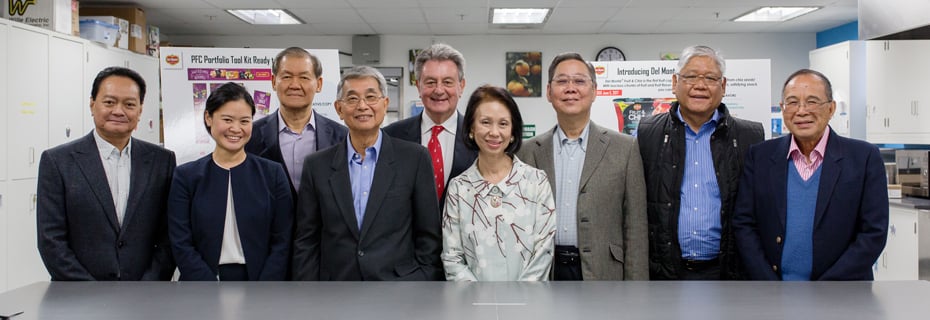

.png?width=900&name=Governance%20Infographic%20(1).png)





